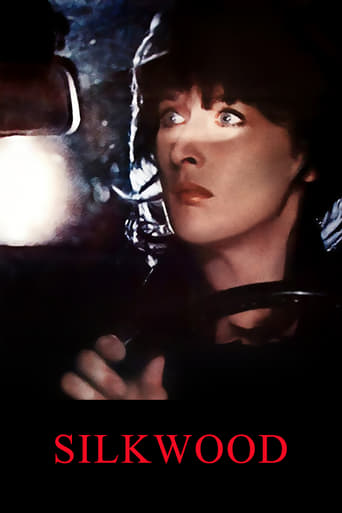Rijndri
Load of rubbish!!
Protraph
Lack of good storyline.
Micah Lloyd
Excellent characters with emotional depth. My wife, daughter and granddaughter all enjoyed it...and me, too! Very good movie! You won't be disappointed.
sashank_kini-1
Silkwood is one of those movies that you simply should not watch at midnight. Unfortunately, my cable television placed the movie at the 12:30 am slot and on top of it kept no intermissions, not even one during the movie. So I had to stay awake late at night and watch this in the living area, dimming the lights around me and lowering the T.V.'s audibility so that my family would not get disturbed by the warning alarm sounds heard often in the film. Without any intermissions, I was a little lost during the movie because keeping an intermission during films does indeed have a powerful impact if placed at the right point – it increases the audience's anticipation and also gives them a break to take in all the details.Silkwood kept chugging on and on in scenes with little dramatic weight (its documentary approach is quite like the lead actress Meryl Streep's other film A Cry in The Dark) or any significant narrative development to hold us in. I quite felt like the movie chose the wrong person to tell its story, and it could've been told better had Karen Silkwood been a supporting character in a film that rather emphasized on the investigation of Kerr-McGee plant and the lawsuit in the aftermath of Silkwood's untimely demise. Unlike Erin Brockovich, Silkwood was not able to directly resolve the issue of health and safety of workers, and though she did play a major role in initiating the whole move, her accident martyrs her for a greater cause. The movie isn't able to deliver her enough justice for her efforts and death, with its epilogue only mentioning that the 'plant closed down a year later' – too grim and defeated to inspire. Karen Silkwood was a courageous small-town gal who took on the Oklahoma nuclear plant where she worked after finding out that it conducted unethical practices without considering workers' safety. From being one of the bubbliest and most beloved persons among her colleagues and supervisors, Karen eventually lost almost everyone's support after helping the union in digging out such malpractices happening at the workplace. Her private life too faced its share of difficulties on top of the mess she was already in even before the incident – apart from losing custody of her three kids, Silkwood's relationship with her boyfriend Drew also suffered when he cautioned her of 'going too far' with the case. She didn't just have to win her colleagues' support but also prove to the union that she was a smart woman with a sharp mind.In one of the film's best acted scenes, Meryl as Karen is discussing recommendations and proposals for the nuclear plant with the senior union members. At first, her suggestions are trivial and her seniors condescendingly put down her ideas and hurriedly begin to leave. It is then that Karen leaves the room and catches them in the corridor where she whispers what she had witnessed at the plant. It is only then that the union takes her seriously. Streep's excellence is evident during close-ups or mid-shots in this movie's case (the film rarely has close- ups), but her screen charisma tends to disappear in her attempt to replicate human-like performances. And this becomes a problem whenever the camera goes away from her, especially here in Silkwood where the cinematography is quite conventional like those old films where the cameras moved less and the actors went back and forth. She's managed to rectify this problem though especially in her recent ventures where her charisma makes for half the performance. Here we manage to catch less than half of whatever she is doing because of the distance the camera maintains.It's not just Streep but also actors Cher, Kurt and director Mike Nichols who act and direct respectively in a similar manner. Now I get it they wanted to depict a dull small-town in Oklahoma with as much truism as possible. Cher (playing Karen's lesbian friend Dolly) wears the most unimposing crumpled and faded jerseys and pants while Russell (playing Karen's boyfriend Drew) is equally untidy and moves around the house shirtless and in cheap blue jeans (though their performances are great). They do everything in their own lazy pace and Cher's Dolly is found half the time either in bed or on the couch. On top of this Nichols makes it even more evident that nothing much happens in 'small town Okie' by placing his camera at a distance. Only a few times do we get shot/reverse shots between the actors and once or twice we see the camera do an effect other than cutting (a few dissolves and an expected fadeout after the crucial scene). Even the upbeat background music at the beginning slowly turns into bleak mournful tunes as the film progresses. It is only the sound of the warning alarm bells that occasionally appear to raise some momentum. There is neither enough follow-up of Silkwood's investigation itself, except for some extended scenes of Karen surreptitiously (hence very slowly) hunting for some 'confidential information'. I could get up in between, bring some chocolates from the fridge in the kitchen and find myself watching her do the same action. The movie 'Silkwood' therefore becomes 'ambitionless' and although I do understand it has deliberately downplayed its 'own cinematic ambition' just to honor the woman's life, the movie as a result also becomes 'one of those inspirational films that come, snag some awards and are soon forgotten'. Or in this film's case, used as a failed 'boob-gag' in Seth MacFarlane's unimpressive Oscar show.
sharkie-294-946704
Intense 1980s flick that is based on the true story of Karen Silkwood (Meryl Streep in an Oscar-nominated role), a woman at a plutonium plant who began to talk about what really went on at the facility where she was employed. It seems that nuclear tampering would lead to the poisoning of the plant's employees and the pollution of the environment. Silkwood was about to talk to the New York Times about the Oklahoma plant when she died under mysterious circumstances in a car accident. The audience knows what is going to happen, but it is getting there that is the fascinating part. Mike Nichols' Oscar-nominated direction is arguably the best of his career, with the exception of his work on "The Graduate". Cher (also Oscar-nominated) proved that she was a legitimate actress as Streep's lesbian co-worker. Kurt Russell also gives his finest performance as Streep's on-again-off-again boyfriend. However with all that said, it is Meryl Streep who gives one of her finest performances in this memorable, remarkable and important motion picture. 4.5 out of 5 stars.
mitch_e33
Set in a small rural town in Oklahoma, 'Silkwood' (1983) follows Karen Silkwood's (Meryl Streep) quest to reveal the truth about the local nuclear power plant she works at. Based upon a true story, Karen is killed in a car accident on her way to meet an editor of the New York Times who was going to help her expose the truth. Living with her boyfriend Drew (Kurt Russell) and friend Dolly (Cher), Karen, a technician in the plant, sees her life turned upside down after she tests positive for radiation poisoning. After she is subsequently moved to a different department, Karen quickly becomes suspicious that the company is putting worker's health at risk in order to fulfill million dollar contracts. A suspicion that ultimately leads to her death. Directed by Mike Nichols, direction for which earned him an Oscar nomination, Silkwood is for the large part a believable, thrilling and touching film. The script by Nora Ephron and Alice Arlen is given life by the two lead actresses, Streep and Cher, both of which gained Oscar nominations for their performances for the high amount of depth and humanity exhibited in each of their characters. At times, however the plot seemed to drag slightly, and Kurt Russell was given little room for character development playing the stereotypical southern blue collar worker, but these are minor criticisms. The bigger problem with this film is the structure. As the audience is let known beforehand that Karen will die at some point, the tension that builds quite effectively through the film is wasted somewhat by a anti-climactic end. A problem that seems to undermine many thrillers/dramas that are based upon true stories as the spoiler is given before the film. Nonetheless, Silkwood is a high quality film and Meryl Streep gives yet another Oscar nominated performance (her 5th at the time) and with her co-star Cher they help lift a film that otherwise may have lacked. 7/10
rpvanderlinden
"Silkwood" is not a paranoia/expose thriller like "The China Syndrome", as I had expected. Although those elements are present "Silkwood" moves in other directions. It's a wonderful movie, a rich, vivid, detailed, heartfelt portrait of a woman, activist Karen Silkwood, and her world. Because of the wide scope of the film and Meryl Streep's portrayal of Silkwood I'll temper my description of her as simply "activist" and add: Woman. Worker. Housewife. Friend. Lover. Fighter. More words will come to me. The film's portrayals of the myriad of people in Karen Silkwood's personal and working lives, are acute and incisive, and its evocation of a time and place, 1970's Oklahoma and Texas, is a tapestry of many colours, a sympathetic but non-glamorization of working class lives, a penetrating look at the ups and downs of love, plus a panoramic view of an arid landscape fouled by heavy industry as far as the eye can see.It's wonderful to see a film that delves so deeply into the lives and personae of its characters. They don't behave the way we expect or even want them to. Silkwood works at a plant which handles plutonium and where white collar management is breaking the law and exposing its blue collar workers to dangerous levels of radiation. The villains are flesh-and-blood people who, themselves, are acting as they do because of real pressures and are the purveyors of established corporate survival instincts. The end justifies the means. Even many of Silkwood's co-workers are against her, fearing for their livelihood. This is not an environment where the workers possess many bargaining chips, and the company holds the trump card - it can pick up and move elsewhere. The film's depiction of the affair between Silkwood and her lover, Drew (Kurt Russell), is special, indeed. The deep well of love they have for each other starts to deteriorate as Silkwood morphs into a self-actualized human being moving into a wider world. The relationship she has with Dolly (Cher), a gay woman sharing her home, is touching and quite lovely.As I write this review political discourse is becoming increasingly antagonistic and the political mood is lurching to the right. Public unions are in danger and people are encouraged to respond to bogus threats and think in opposition to their own self-interest. Isn't this, essentially, what "Silkwood" is about? The pervasive climate of fear? "Silkwood" is not about heroines but about human beings caught in an untenable situation over which they have no control and few resources at their disposal. With the end result in doubt and her safety in jeopardy Silkwood does not leap over tall buildings, but she does the best that a human being can do. That's where the film achieves its profundity. It's the best kind of film, one which deals, in a meaningful way, with the human experience.

